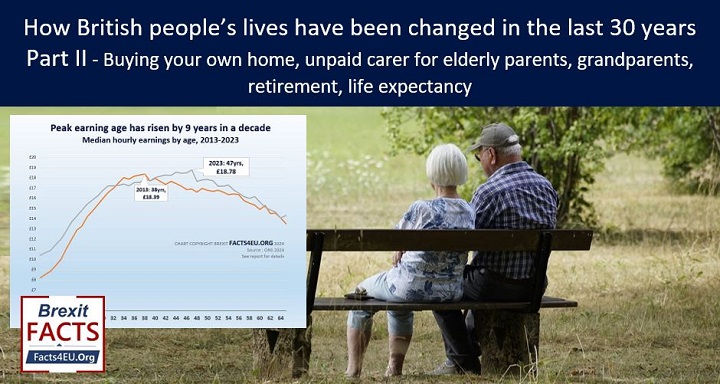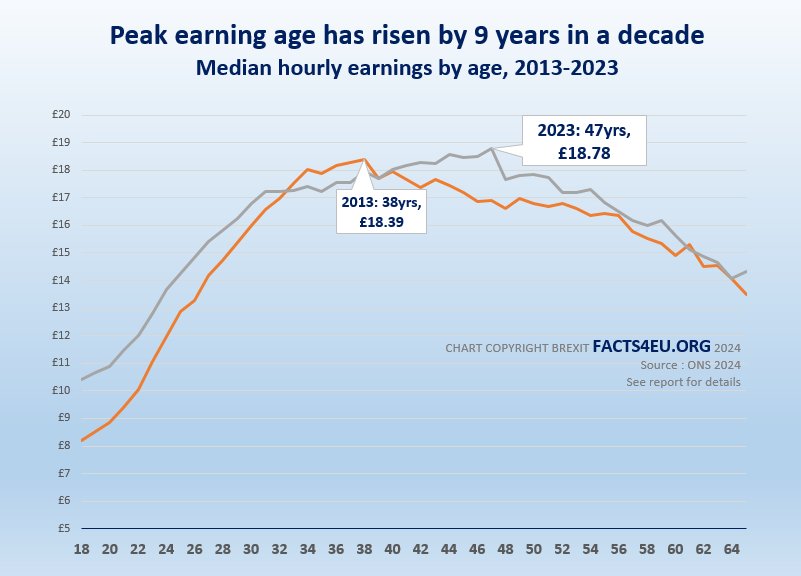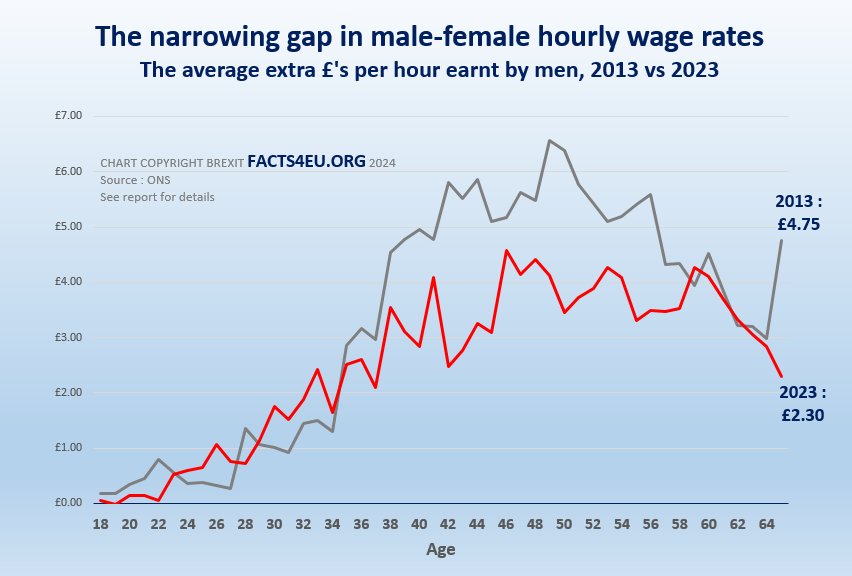The changing face of Britain and our lifestyles – Part II
How has life changed for us all? We publish Part II of our summary
Montage © Facts4EU.Org 2024
A Facts4EU.Org look at the changing face of Brexit Britain
Following Part I yesterday identifying fundamental changes in our lifestyles, we conclude today with Part II.
As with yesterday’s report we use the latest data from the Office for National Statistics and other official bodies, and show the shifts in what it was to be British some 30 years ago after Tony Blair came to power, compared to what it looks like today.
A Brexit Facts4EU.Org Series on British lifestyle changes
Part I – Starting work, university, moving out, moving in with a partner, marriage, babies
Part II - Owning your home, peak earning age, unpaid carer for elderly parents, becoming grandparents, retirement, life expectancy (This report)
In this two-part series we look at the changing lifestyles of the British people. We summarise the facts and then comment. Then we leave readers to judge the positives and negatives.
British lifestyle changes over the years – Part II
[Sources : Latest data from the Office for National Statistics, 08 Apr 2024, plus other official reports.]
What follows varies in the time periods specified. All figures are the latest available.
The age for peak earnings has risen dramatically
In 2023, people aged 47 years had the highest average wage (gross median hourly earnings, including overtime), at £18.78 per hour. Just 10 years ago the peak was at the age of 38 years – nine years younger.
Whilst median earnings fall between age 50 and retirement, this does not mean that individuals’ pay will decrease. Higher earners may retire early and because of the way statistics work this reduces the median wage of those remaining in employment. In addition, people may change roles and hours worked.
© Brexit Facts4EU.Org 2024 - click to enlarge
[Source : Annual Survey of Hours and Earnings (ASHE) from the Office for National Statistics.]
Facts4EU.Org comment : It now seems that many people have chosen not to return to work at all after the government’s social experiment during the COVID period. This will have affected the peak earnings age dramatically. Certainly we know it continues to be almost impossible to contact civil servants we need to speak to, as they are apparently “working from home”.
Men compared to women - the gap narrows
Men’s average hourly wage is higher than women’s at nearly all ages, but the gap between men and women’s hourly earnings became smaller between 2013 and 2023. For all employees (full-time and part-time) the gender pay gap was 20% in 2013 but 10 years later this had fallen to 14%.
Facts4EU.Org comment :Despite 30% more women than men studying at university, the average woman’s hourly wage is lower than men’s at all ages over 20. Women’s median earnings peak at age 42 (£17.05), five years earlier than men’s.
[Source : Annual Survey of Hours and Earnings (ASHE) from the Office for National Statistics.]
© Brexit Facts4EU.Org 2024 - click to enlarge
Facts4EU.Org comment : That said, and as we reported yesterday, by the age of 40, 66% more men than women are working full-time. From an employer’s point of view this naturally makes it more desirable to invest in and employ a man as he is much more likely to generate income for the company for longer. This may not be right - or indeed lawful - but it might explain certain things.
Providing unpaid care
In the 2021 Census, of all people providing unpaid care, more than a quarter are in their 50s. This peaks at the age of 59.
More women than men provide unpaid care, and women also spend more time doing unpaid housework whilst men spend more time doing paid work. The proportion of people of both sexes providing unpaid care has gone down from 13% in 2011 to 10% in 2021.
Facts4EU.Org comment : This fall in unpaid care may be because of:
- Covid-19 restrictions which limited travel and household mixing
- Changes to the question wording in Census 2021
Owning your own home
In 2022, more than 50% of people owned their home outright at age 61. This is two years earlier than in 2004. Longer mortgages (over 30 years) are becoming more available, and the age of first-time buyers is increasing.
Facts4EU.Org comment : In 2022/2023 a higher proportion of homes were owned outright (35%) than with a mortgage (29%), according to the English Housing Survey. This has been the trend for the last 10 years.
When do most people become grandparents?
As people are becoming parents later in life, so people are also becoming grandparents later in life. In 2021-2022, more than half of people were grandparents by age 65, four years older than 10 years previously.
Based on an Institute for Fiscal Studies (IFS) study in England, a third of families with children aged between 1-2 years used unpaid, informal childcare such as care from grandparents in 2019. Costs for a part-time nursery place for a child aged under two grew by 60% between 2010 and 2021 – twice as fast as average earnings.
Facts4EU.Org comment : The increasing age of grandparents may make it more challenging for them to provide care for grandchildren because of the increased likelihood of health problems.
When do we retire?
On average we are working for longer. The age when more than half of people were retired increased from 64 years in 2011 to 66 in 2021.
There has been a larger increase in average retirement age for women (from 61 years in 2011, to 66 years in 2021) than for men. This is because the state pension age for women was increased from 60 to 66 during this time to be the same as that for men. In 2011, a law allowing employers to force workers to retire at 65 was repealed, giving more people the choice to work past this age.
[Source : Office for National Statistics.]
How long can you expect to live?
Women who are at retirement age (66 years) can be expected to live on average to 87, and men aged 66 years can be expected to live until 85. Women aged 66 have a 5.5% chance of living to 100, compared with a 3.1% chance for men.
There has been a larger increase in average retirement age for women (from 61 years in 2011, to 66 years in 2021) than for men. This is because the state pension age for women was increased from 60 to 66 during this time to be the same as that for men. In 2011, a law allowing employers to force workers to retire at 65 was repealed, giving more people the choice to work past this age.
Facts4EU.Org comment : The increasing age of grandparents may make it more challenging for them to provide care for grandchildren because of the increased likelihood of health problems.
It must be said that this is improving all the time, as better treatments become available. Find our your projected life expectancy and chance to live to 100 using this life expectancy calculator.
[Source : Office for National Statistics.]
Observations
Facts4EU.Org needs you today
We are a 'not for profit' team (we make a loss) and any payment goes towards the actual work, not plush London offices, lunch or taxi expenses, or other luxuries of some organisations.
We badly need more of our thousands of readers to become members, to support this work. Could this be you, today? It's quick and easy, we give you a choice of two highly secure payment providers, and we do NOT ask you for further support if you pay once. We just hope you keep supporting us. Your membership stays anonymous unless you tell us otherwise.
Please don't assume that other people will keep us going - we don't receive enough to survive and we need your help today. Could you help us? We rely 100% on public contributions from readers like you.
If you believe in a fully-free, independent, and sovereign United Kingdom, please join now by clicking on one of the links below or you can use our Support page here. You will receive a personal, friendly ‘thank you’ from a member of our team within 48 hours. Thank you.
[ Sources: Office for National Statistics ] Politicians and journalists can contact us for details, as ever.
Brexit Facts4EU.Org, Sat 13 Apr 2024
Click here to go to our news headlines
Please scroll down to COMMENT on the above article.
And don't forget actually to post your message after you have previewed it!
Since before the EU Referendum, Brexit Facts4EU.Org
has been the most prolific researcher and publisher of Brexit facts in the world.
Supported by MPs, MEPs, & other groups, our work has impact.
We think facts matter. Please donate today, so that we can continue to ensure a clean Brexit is finally delivered.
Paypal Users Only - Choose amount first
Quick One-off
Monthly





Something to say about this? Scroll down for reader comments